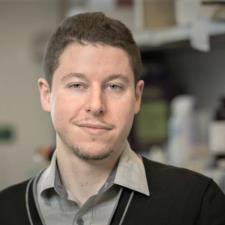1,710 Answered Questions for the topic biochemistry
05/11/19
What makes us hungry?
Biochemistry Neuroscience
05/11/19
What limits the maximum spacing of Nodes of Ranvier and which organisms tend to have the widest gaps?
Assuming that a longer distance between gaps in the myelin sheath is beneficial for an organism due to the increased propagation speed, what is the limiting factor in determining the maximum...
more
05/11/19
Why is thymine not incorporated into mRNA?
I am aware that in transcription uracil bonds to adenine and not thymine. But what is it that actually prevents thymine from bonding to adenine in transcription, that is not present in replication?
05/10/19
What is the purpose of gluconeogenesis?
The gluconeogenesis pathway seems quite pointless to me. I don't understand why an organism would want to spend energy to create a molecule that can then be metabolized again for less energy? The...
more
Biochemistry Rna
05/10/19
How is RNAse contamination in RNA based experiments prevented?
Does anyone have any suggestions to prevent RNAse contamination when working with RNA?I tend to have issues with degradation regardless of whether I use DEPC treated / RNAse free water and filtered...
more
05/10/19
During starvation, does the human body do anything to prioritize which organs receive nutrients?
When food is scarce, the body slows its metabolic rate to conserve energy. Are there any other systems or processes that prioritize which organs receive nutrients?
Biochemistry Pharmacology
05/07/19
Meta-analysis of fruits in blocking Cytochrome family?
My professor says that some drugs cannot be used with grapefruit. I am trying to search a list of cytochromes and their effect to block members in the cytochrome family. Some in Cyt P450.**What is...
more
05/07/19
How does methamphetamine (meth) damage neurons?
Meth is considered to be neurotoxic by forming reactive oxygen species and oxidizing the neurons. But unlike dopamine, which, by the way, [is neurotoxic due to ROS induced dopaminergic...
more
05/07/19
Why do mints make your mouth feel cold?
Why do mints make your mouth feel cold? And specifically, why does your mouth feel so cold if you eat a few mints and then drink a glass of cold water afterwards?
05/07/19
When running a gel, what could cause a standard to run "faster" than usual?
We are running a gel on the products of a restriction digest to determine the size of an insert. We know the vector backbone size should be ~2.9kb; however, the standard appears to be running too...
more
05/07/19
How do antioxidants affect human metabolism?
I'd like to know how antioxidants affect human metabolism and which ones are essential for metabolic processes.
05/07/19
Why don't we feel hungry after waking up?
Yesterday, I was fasting (drinking only water until I had dinner at 9 pm). After dinner, I went back to my lab (I am a Master's student) and worked till 1:30 AM. By 1 o' clock, I was feeling *quite...
more
05/04/19
Why is the brain dependent on glucose?
The strict dependence of the (human) brain on glucose has always been puzzling to me. While ketones can substitute for a portion of the brain's energy needs, it cannot substitute completely: blood...
more
05/04/19
How does paracetamol work?
[Hinz *et al.* 2008](https://www.ncbi.nlm.nih.gov/pubmed/17884974) found that COX-2 may be inhibited by paracetamol, and this is attributed to it's...
more
05/04/19
Why is the effect of competitive antagonist less than the effect of non-competetive antagonists?
Drugs can be provided as a competive or non-competitive form of agonists. But the effect of non-competitive antagonists is much more than the other, so what is the cause of that? And are there...
more
Biochemistry Physiology
05/02/19
Respiratory Physiology: Hemoglobin
A woman dumped a bucket of ice water over her head to raise global awareness about a neurological disease called amyotrophic lateral sclerosis, ALS. Which of the following correctly describes what...
more
04/30/19
How does the body switch between aerobic and anaerobic respiration?
Lets take the case of a person doing heavy exercise. Aerobic respiration is taking place, but oxygen is about to be finished up. Glycolysis occurs, Krebs cycle finishes. Now NADH and...
more
04/30/19
Why is too much glucose harmful?
I learned the citric acid cycle in biotechnology school and how cells work; about ADP and ATP and how the Cellular respiration (C6H12O6 + 6O2 -> 6CO2+6H2O) works.I am interested in understanding...
more
04/28/19
Concentration dependent cellular processes?
Are there any famous biological processes that depend strongly on a chemical concentration reaching a particular value, like some sort of switch? E.g. if concentration of chemical x reaches...
more
Biochemistry
04/27/19
Why does Rigor Mortis occur after death?
After someone dies they become stiff, this is termed Rigor Mortis and happens because the cells run out of ATP (I think). But why do the cells need it to remain flexible?
Biochemistry Botany
04/26/19
Are there any plants that fix their own nitrogen?
I know that most nitrogen is fixed through industrial processes and bacterial symbiotic relationships. However, are there any plants that can fix their own atmospheric nitrogen?
04/23/19
Selective Androgen Receptor Agonist?
I'm looking for an inducer that strongly activates the androgen receptor, but not the glucocorticoid receptor that is not DEA regulated. I know that SARMS (Selective Androgen Receptor Modulators)...
more
Biochemistry Organic Chemistry
04/23/19
What are the olfactory chemicals in whiteboard/permanent markers and what do they bind to in the nose, lungs, and brain?
04/21/19
When should endocytosis inhibitors be used in cell binding assays?
I'm beginning to do some cell-binding assays and I would like for my proteins to not be endocytosed by my mammalian cells. Typical suggestions are for the cells to be kept on ice and that the...
more
04/20/19
In which direction does ATP synthase rotate?
I heard about the rotation of ATP synthase in a biochemistry course. The professor said it will rotate counterclockwise. Is that true? If so, what mechanism defines its direction?
Still looking for help? Get the right answer, fast.
Ask a question for free
Get a free answer to a quick problem.
Most questions answered within 4 hours.
OR
Find an Online Tutor Now
Choose an expert and meet online. No packages or subscriptions, pay only for the time you need.























